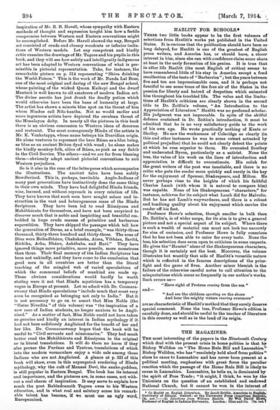HAZLITT FOR sumo's., THESE two little books appear to be
the first volumes of selections from Hazlitt's works yet published in the United States. It is curious that the publication should have been so long delayed, for Hazlitt is one of the greatest of English prose writers, and America has, or should have, a closer interest in him, since she can with confidence claim some share at least in the early formation of his genius. It is true that in after life Hazlitt (the most English of critics) seems to have remembered little of his stay in America except a fond recollection of the taste of "Barberries"; but the years between five and ten are impressionable ones, and it is perhaps not fanciful to see some trace of the free air of the States in the passion for liberty and hatred of despotism which animated him throughout his troubled life. The value and the limita- tions of Hazlitt's criticism are clearly shown in the second title to Dr. Zeitlin's volume, " An Introduction to the Appreciation of Literature." Thalia was no profound scholar. His judgment was not impeccable. In spite of the skilful defence contained in Dr. Zeitlin's introduction, it must be admitted that he is no very satisfactory guide to the work of his own age. He wrote practically nothing of Keats or Shelley. He saw the weaknesses of Coleridge so clearly (in this and other instances he was to some extent actuated by political prejudice) that be could not clearly detect the points at which be rose superior to them. He overrated Southey and underrated Byron, particularly as a satirist. None the less, the value of his work on the lines of introduction and appreciation is difficult to overestimate. His relish for the great writers of the past was insatiable, and there is no critic who puts the reader more quickly and surely in the key for the enjoyment of Spenser, Shakespeare, and Milton. He never perhaps rises to the heights of which his faithful Charles Lamb (with whom it is natural to compare him) was capable. None of his Shakespearean "characters," for instance, achieves for its subject what Lamb did for Malvolio. But he has not Lamb's waywardness, and there is a robust and headlong quality about his enjoyment which carries the reader off his feet.
Professor Howe's selection, though smaller in bulk than Dr. Zeitlin's, is of wider scope, for its aim is to give a general picture and not a special aspect of its subject. Where there is such a wealth of material one must not look too narrowly for sins of omission, and Professor Howe is fully conscious that he has not been able to cater for every taste. None the less, his selection does seem open to criticism in some respects. He gives the" Hamlet" alone of the Shakespearean characters, though it is certainly not the best. Moreover, the volume illustrates but scantily that side of Hazlitt's versatile nature which is reflected in the famous descriptions of the prize- fight and the game of fives. Another minor blemish is the failure of the otherwise careful notes to call attention to the misquotations which occur so frequently, in our author's works. Such errors as— "Have sight of Protons coming from the sea " and-
" And see the children sporting on the shore
And hear the mighty waters roaring evermore"
are so characteristic of Hazlitt's method that they surely deserve special comment. None the less, Professor Howe's edition ior carefully done, and should be useful to the teacher of literature in this country as well as in the land of its origin.














































 Previous page
Previous page